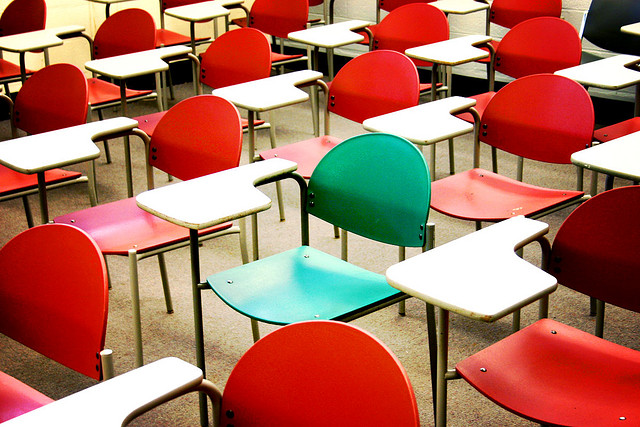“What manner of education will reduce dropouts?”
July 2 The rate of school dropouts is a vote of no confidence in the world’s educational systems, says Ryan Bachoo, 23, a Commonwealth Correspondent from Trinidad and Tobago. He makes the case for alternate instructive systems that bring out the best in every student.
The rate of school dropouts is a vote of no confidence in the world’s educational systems, says Ryan Bachoo, 23, a Commonwealth Correspondent from Trinidad and Tobago. He makes the case for alternate instructive systems that bring out the best in every student.
Every year in the United States, over a million students drop out of high school and about a quarter of high school freshmen fail to graduate from high school on time.
In 2011, an international study by the Organisation for Economic Co-operation and Development showed that per capita more 15- to 19-year-olds in the United Kingdom are ‘Neet’, i.e. not in employment, education or training, than in most other developed nations.
Canada’s drop-out was as high as 17 per cent at the start of the 1990s and they’ve managed to slash that figure by less than ten per cent.
In Trinidad where I live, things are also very grim. In 2011, it was found that a total of 17,000 students graduated from the elementary school system five years earlier, but only 13,500 wrote five subjects or more while 3,500 dropped out and 6,500 got five subjects or more at the Caribbean Secondary Education Certificate (CSEC) level.
This is not a ‘now’ thing. It’s been going for generations, yet millions of dollars are pumped into the world’s educational systems every fiscal year.
Trinidad & Tobago’s minister of education, Dr. Tim Gopeesingh, admitted that such failure has been going on for the past 45 years. Successive governments have been unable to stem the dropout rate.
There are many theories as to why the dropout rates are so high in many countries. In my view, student dropouts are not to be blamed. If you are reading this from Finland, you may not know what a ‘dropout’ is, because in Finland there are no dropouts. There, standardized testing is at the barest minimum, while experts are usually called to the aid of students who have problems learning in a particular field.
I listened recently to Joel Josephson, founder of the Kindersite Project and European Union education projects. One of the best points he made is that we must “educate our children for their futures, not our past.” The industrial revolution is on its way out. It will possibly be not half of what the technological revolution will be. The technological revolution is starting to take effect and we must prepare our children for it.
A good place to begin such preparation is to take on standardized examinations in the world’s educational systems. Why are they the climax of almost every term, trimester or semester in the world? Don’t get me wrong; there is and will always be value for standardized testing, but is placing so much emphasis on it taking away from students’ learning?
There are fields such as medicine and aerodynamics which require heavy standardized testing. But there are many other fields which don’t. At the Ken Gordon School of Journalism where I studied, 99 per cent of the journalism courses did not have final examinations. What could you possibly test a journalist on? Instead, the College’s board made the courses very practical, and such policy has produced most of my nation’s best print and broadcast journalists.
The huge problem with examinations is that they usually serve to scare students. I have written tons of exams in my life, and passed a lot of them, but the knowledge has not lasted. Once you pass exams you’ve passed the course, even if you forget everything you did a week later. This system of education encourages students to memorize, not to learn, and that defeats the whole purpose of education.
During my secondary education, I was very slow in learning physics and chemistry, as were many other students. Some others were very fast in learning about the moles and Newtons. In the same period of 15 weeks, we all had to learn the same content at the same pace. Such a system did not take into cognizance our learning differences. In many cases, practical learning and areas like the music and arts were neglected.
There’s a disorder that scientists link to children’s learning called Attention Deficit Hyperactivity Disorder, which I binned from the very first time I read about it. If children in a classroom are more playful than others, it doesn’t mean that they have an attention disorder. Children are supposed to be energetic and playful. I, myself, never learned a lot confined to a classroom, and it’s the same for many children today.
Every student who drops out may have a justifiable reason: the classes might be boring, not motivating or simply not taking them where they would like to go. Instead of pumping money into a system that is seeing millions of students drop out yearly, we should begin investing that money in different approaches.
One main move would be setting up initiatives for some students to learn outside of school, totally ignoring classrooms, locked gates and commanding teachers. We tend to forget that teachers are not supposed to tell us but enlighten us, and more importantly, motivate us. The first twenty-five years of someone’s life should be very motivating.
I have felt very strongly about this topic ever since having to go through an educational system that stifled my creativity and called my energy a nuisance in class. And guess what! I bet that there are millions of children around the world who feel the same way that I do. Some stick it out. Others don’t and they are called dropouts.
photo credit: Night Owl City via photopin cc
………………………………………………………………………………………………………………
About me:
“Hi, my name Ryan Bachoo. I’m a Journalist and Public Relations Practitioner from PrincesTown in the twin island of Trinidad and Tobago. I’ve moved into the field of Mass Communication now. I currently work for the West Indies Cricket Board, protecting the online image of West Indies Cricket.
I’ve been a Broadcast Journalist at Cable News Channel 3 for three years. For the Commonwealth Youth Secretariat, I write on topics of politics, war and economics.”
Ryan Bachoo
Journalist & Public Relations Practitioner
The People’s Writer
I speak for those who have no voice!
…………………………………………………………………………………………………………………
Opinions expressed in this article are those of the author and do not necessarily represent the views of the Commonwealth Youth Programme. Articles are published in a spirit of dialogue, respect and understanding. If you disagree, why not submit a response?
To learn more about becoming a Commonwealth Correspondent please visit: http://www.yourcommonwealth.org/submit-articles/commonwealthcorrespondents/
…………………………………………………………………………………………………………………




